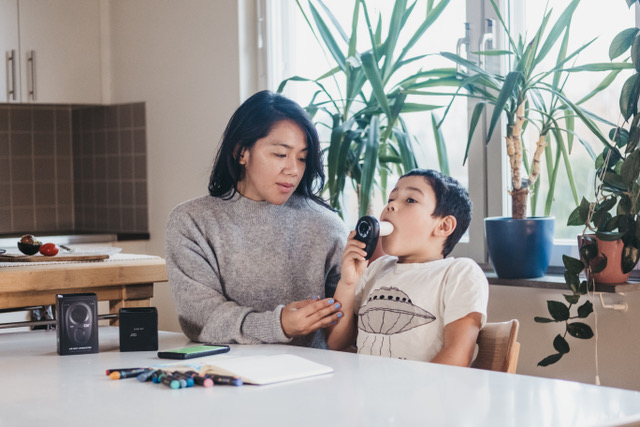Home Monitoring of Lung Health Possible With NuvoAir System, Studies Report

A family using the NuvoAir respiratory platform. (Photo courtesy of NuvoAir)
The NuvoAir Home platform — NuvoAir’s respiratory support system for people with lung diseases — allows adults and children with cystic fibrosis (CF) to gather high quality data on the health of their lungs at home and without medical supervision.
Adherence to NuvoAir’s respiratory system, and its acceptance, was high by patients of all ages, and the system was regularly used as part of a self-monitoring routine. In one study, spirometry data collected was also successfully shared with doctors prior to a telehealth exam.
These are the main findings of three small studies, conducted in the U.K. and Sweden, and presented in separate posters at the online 2020 North American Cystic Fibrosis Conference (NACFC).
“We are delighted to see a growing body of evidence demonstrating the value of our platform. The ability to empower both children and adults to perform high quality measurements from home is essential for clinicians to make the right clinical decisions,” Lorenzo Consoli, CEO of NuvoAir, said in a release provided to Cystic Fibrosis News Today.
“High-quality data coupled with strong adherence and patient satisfaction represent the foundation of NuvoAir’s product strategy,” Consoli added.
NuvoAir’s respiratory support system, formerly known as Aria, uses a handheld FDA-approved Bluetooth spirometer called Air Next — a portable device that can be used to measure several parameters of lung function — along with a smartphone app and a doctor portal.
The system is designed to allow patients to take spirometry measures and share this information with their healthcare providers through the portal. The smartphone app has a built-in coaching system that informs patients of the quality of the measurements they take. In addition to keeping a care team aware of changes in lung health, patients can use the system to monitor their health as often as they wish.
In the first poster, “Quality of Home Spirometry in Patients With Cystic Fibrosis,” investigators at NuvoAir and at the U.K.’s Royal Brompton Hospital presented data covering 37 adults with CF who used the NuvoAir Home platform to monitor their lung function for nearly a year.
Over about 355 days, these patients (average age about 32) performed a total of 783 unsupervised home spirometry sessions, or 21.2 sessions per patient, with one taken every two to three weeks.
Data indicated the quality of lung function measurements obtained during these unsupervised sessions was identical to that collected in a first supervised spirometry session at a hospital. Adherence to a twice monthly spirometry monitoring program was also high.
“Spirometry quality was found to be equivalent in the unsupervised home setting using the NuvoAir system, suggesting that remote spirometry has a place in the long-term monitoring of lung function in CF,” the investigators wrote.
In the second poster, “Quality of Home Spirometry in Adolescent CF and Bronchiectasis Patients,” researchers at the Royal London Hospital presented data covering 30 children (average age, 13) with CF and bronchiectasis who used NuvoAir’s system for six weeks, between April 23 and June 4.
These teenagers performed a total of 95 spirometry tests at home without medical supervision, after being given virtual instructions. Analyses showed that 74% of these assessments were considered reproducible, according to the technical standards defined by the American Thoracic Society (ATS) and the European Respiratory Society (ERS) for spirometry tests in 2005.
The unsupervised spirometry test measures were found to be nearly identical to those given the children at their last hospital visit.
In the third poster, “A Virtual Clinic and Remote Monitoring in Children With Cystic Fibrosis,” researchers at the Sahlgrenska University Hospital in Sweden reported findings from a study involving 13 children with CF, ages 6–17, being treated at that hospital, and their parents.
This study also aimed to determine if young patients could reliably perform at-home spirometry tests using NuvoAir’s system, and if they could share results of these tests with a health team in two virtual, telehealth meetings.
Analyses indicated that 12 of these 13 patients correctly took spirometry measures meeting ATS/ERS standards without medical supervision.
Before each virtual visit, the 13 children were asked to create and submit to their doctors a pre-visit report containing spirometry data using the Genia CF app.
Pre-visit reports were properly created and sent by the children for each of the total 26 virtual visits held over the study’s six weeks.
Patients and their parents were then asked to complete a short questionnaire rating these virtual clinic visits. From the 24 (11 children and 13 parents) respondents who completed the survey, 23 rated the virtual meetings as “equal” or “better” than in-person visits. The hospital was, on average, a 120 km (about 75 mile) trip for these patients and their parents, the researchers noted, requiring time taken off from school or work.
“This study indicates that it is possible for children to perform spirometry and other health-related measurements at home. Children with CF and their parents were [also] positive to continue with virtual visits,” the investigators wrote.
This pediatric CF hospital is now leading a multicenter study, involving 70 children and adolescents with CF, ages 5–17, to compare changes in disease outcomes with telehealth, via measures that include quality of life, and nutritional and respiratory status taken before and after a remote medical visit.







